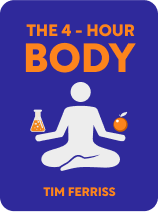

This article is an excerpt from the Shortform book guide to "The 4-Hour Body" by Timothy Ferriss. Shortform has the world's best summaries and analyses of books you should be reading.
Like this article? Sign up for a free trial here .
Are you trying to understand why you have fat on your body? Why is understanding blood sugar levels important?
In The 4-Hour Body, Tim Ferriss discusses the impact of insulin on your body storing fat. Understanding blood sugar levels and how your body responds is the key to body recomp.
Keep reading for an understanding of blood sugar levels, insulin, and how your body stores fat.
Understanding Blood Sugar Levels and Insulin
Insulin is a hormone that absorbs sugar from the bloodstream and, among other things, transforms this sugar into energy or stores it as fat. Your body naturally releases insulin whenever your blood sugar rises—generally, whenever you eat or drink. The less insulin you release, the less fat your body stores. Understanding blood sugar levels and how it relates to your insulin production is important.
Glycemic index (GI) and glycemic load (GL) are measures of how much a food increases blood sugar. (GL corrects for portion size and is calculated by multiplying GI by the number of carbohydrates.) These measurements have two downsides: 1) they don’t take into account different body chemistries and genetics, and 2) they’re all isolated measurements and most people eat food in combination, so the math is challenging.
The author wasn’t satisfied with GI and GL, so he monitored his blood sugar levels using a DexCom, a medical implant usually used by diabetics. He experimented with eating different foods, and different combinations of foods, to see how long it took them to affect his blood sugar and how much the levels changed. Understanding blood sugar levels was part of the author’s self-experimentation. The author discovered all of the following about his own body. While everyone is different, others have found his discoveries accurate for themselves:
Discovery #1: Maintaining a constant blood sugar of 100mg/dL is ideal for fat loss. Understanding blood sugar levels to be able to maintain your levels is critical. Consuming the following will help keep your blood sugar level flat:
- Fat. Eat fat, such as nuts, before you eat the rest of your meal to keep your blood sugar levels more constant.
- Fructose (fruit sugar). While fructose can help you maintain constant blood sugar, it also slows fat loss, so consume it sparingly.
- Fresh lemon juice. In the author’s experiments, if he consumed three tablespoons of lemon juice before eating, his blood sugar level spike was 10% lower than it would have been.
- Cinnamon, which reduces the glycemic index of food by up to 30%. This is partly because cinnamon makes it take longer for food to leave your stomach, which not only affects your blood sugar but makes you feel full. To use cinnamon most effectively:
- Choose Saigon cinnamon, which is most effective. Cassia cinnamon is next-best.
- Make sure the cinnamon is fresh—it loses potency over time.
- Don’t eat more than one and a half teaspoons a day—cinnamon contains some substances that are dangerous in large quantities, such as coumarin, which is a blood thinner.
Discovery #2: Vinegar doesn’t reduce the glycemic index of food. While there’s a lot of scientific evidence to support that consuming vinegar with a meal can lower its glycemic index, the author found vinegar had no effect on him. He thought that might have been because he wasn’t consuming enough vinegar, or because it was reacting with something else he was eating.
Discovery #3: The speed at which you eat affects your blood sugar levels. When you eat quickly, your body digests food all at once, which causes a spike in blood sugar. Eat more slowly to flatten the curve—take at least half an hour to eat each meal. To do this, you might:
- Divide your plate into sections and take breaks in between each section. For example, the author divides his plate into thirds and waits five minutes after eating each portion.
- Force yourself to chew more, which will force you to eat more slowly. For example, Matt Mullenweg forced himself to chew each mouthful 20 times. Making this one change lost him 18 pounds.
Discovery #4: Drinking water dilutes digestion. Drink water while you eat, ideally while you’re taking breaks between plate sections. (Shortform note: In fact, drinking water doesn’t dilute digestive juices, but it does aid digestion in other ways such as softening food.)
Discovery #5: It takes a long time for food to increase blood sugar. It usually took 90 to 180 minutes after eating before the author would see his blood sugar spike. Orange juice was faster, at 40 minutes. This meant that if the author needed energy for a workout, he needed to eat between an hour and a half and two hours before going to the gym. Understanding blood sugar levels and when to optimize them will also help you change your body.

———End of Preview———
Like what you just read? Read the rest of the world's best book summary and analysis of Timothy Ferriss's "The 4-Hour Body" at Shortform .
Here's what you'll find in our full The 4-Hour Body summary :
- How to do the least amount you need to do for the results you want
- Why you need a cheat day in your diet
- How to improve everything about your body, including sleep, sex, and longevity






